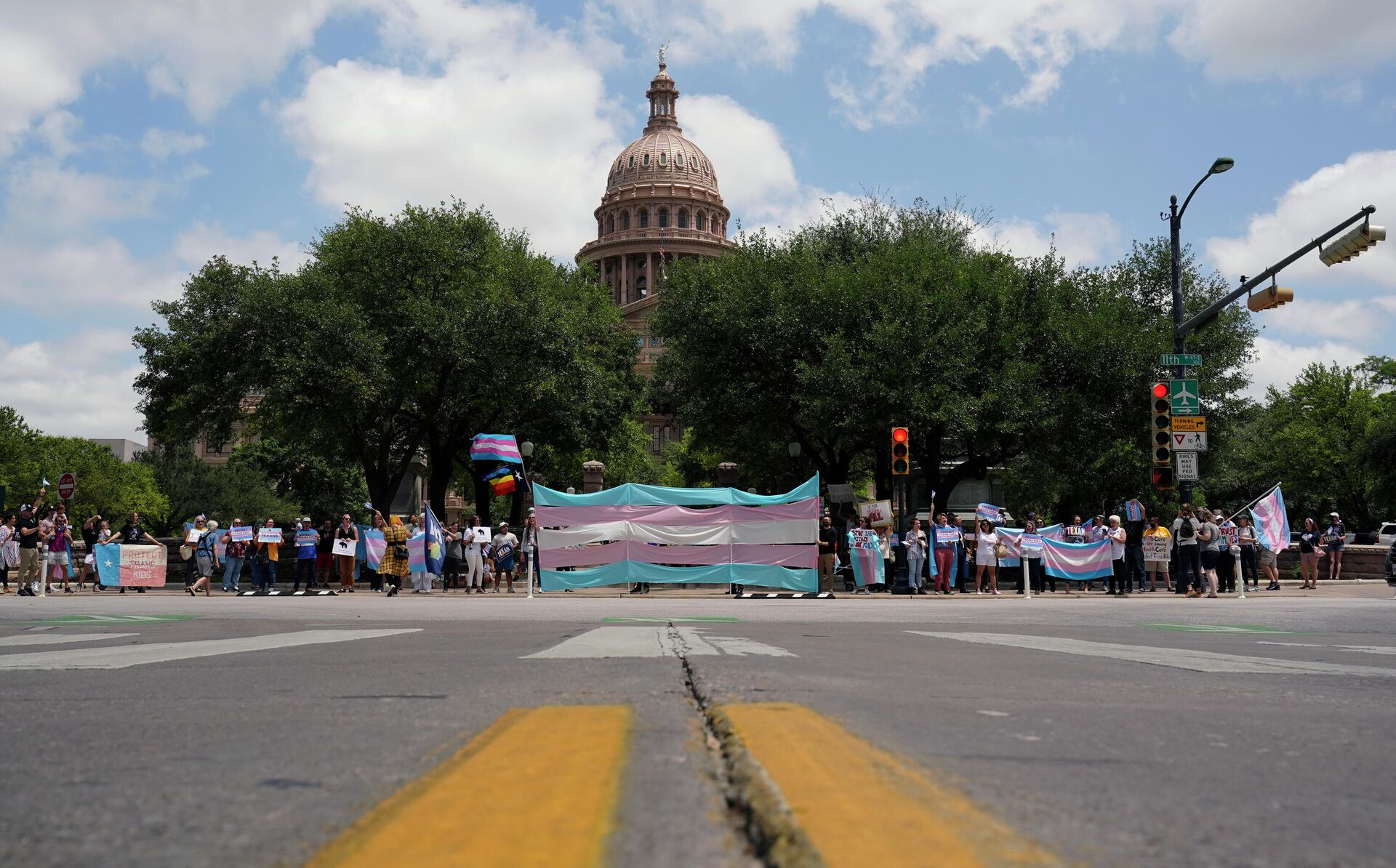Over 2,200 Texas Child Welfare Workers Quit, Many Citing Policy Targeting Transgender Youth - Report

© AP Photo / Eric Gay
Subscribe
On Friday, US Rep. Marjorie Taylor Greene (R-GA) introduced in Congress a bill that would make it a felony to give transgender children gender-affirming care, for colleges to teach gender-affirming care of any kind, and for health insurance companies to cover such care - even for adults.
More than 2,220 employees have quit Texas’ Department of Family and Protective Services (DFPS) since the beginning of 2022, with many of them saying they opposed the department’s mission being contorted to suit political ends.
According to the Houston Chronicle, about 83% of the 2,267 employees who left the department between January 1 and August 3 did so by quitting. While they cited myriad reasons for leaving, including being overburdened by workloads and the emotional burdens of the job, many said they left specifically because of a directive by Texas Governor Greg Abbott for DFPS to investigate parents of transgender children and treat them giving their child affirming care as a form of child abuse.
“There are a ton of social workers who do already identify with the LGBTQ community, me being one myself,” Shelby McCowen, an investigator from Travis County, told the paper. “It kind of feels like we’re turning on family members at this point.” She added that Abbott’s directive was the “last straw” for many coworkers.
The exodus is the DFPS’ largest since 2017, although it typically loses nearly 2,000 people a year. According to the DFPS website, in 2019, its staff was more than 12,000 strong.
DFPS Commissioner Jaime Masters told a federal judge in June that the agency’s high turnover is “absolutely a crisis,” according to the Chronicle. Caseworkers handle an average of 17 cases per day and have struggled to find placement for hundreds of children. In July 2022, the agency had nearly 22,000 children in legal conservatorship, according to DFPS data.
“I have been traveling the state to meet with staff to hear what their concerns are and to see what we can do about it - a lot of it is morale, a lot of it is just the job itself is hard, even when we don’t have a ‘Great Resignation,’” Masters said in June. “This is a hard job to keep staff in anyway because of the nature of the work.”
A ‘Politicized Intrusion’
Abbott’s February 23 order characterizes giving transgender children affirming medical care, including puberty blockers, hormone therapy, or surgeries, as irreversible, harmful, and equivalent to “sterilization” policies weaponized against minority groups such as Black women and disabled people. However, effectively every major medical organization, including the American Medical Association, the American Academy of Pediatrics and the American Psychological Association, say that gender-affirming care is a medical necessity for transgender youth based on decades of research.
“This ill-conceived directive from the Texas governor will put at-risk children at even higher risk of anxiety, depression, self-harm, and suicide,” said Frank Worrell, president of the American Psychological Association, in a February 24 statement. “Gender-affirming care promotes the health and well-being of transgender youth and is provided by medical and mental health professionals, based on well-established scientific research. The peer-reviewed research suggests that transgender children and youth who are treated with affirmation and receive evidence-based treatments tend to see improvements in their psychological well-being.”
“Asking licensed medical and mental health professionals to ‘turn in’ parents who are merely trying to give their children needed and evidence-based care would violate patient confidentiality as well as professional ethics. The American Psychological Association opposes politicized intrusions into the decisions that parents make with medical providers about caring for their children,” he added.

Demonstrators gather on the steps to the State Capitol to speak against transgender related legislation bills being considered in the Texas Senate and Texas House, Thursday, May 20, 2021, in Austin, Texas.
© AP Photo / Eric Gay
Further, the effects of puberty blockers are fully reversible and it’s extremely rare for hormone replacement therapy to be administered to children under the age of 16, even trans children, and almost unknown for gender affirmation surgery to be performed under the age of 18.
Opponents Cite UN’s Genocide Convention
Opponents have also noted the policy change is something only the legislature can effect - something Texas’ hasn’t done yet, despite passing several other laws that restrict the rights of trans people, including the right of trans girls and women to play on women’s sports teams.
The effect of Abbott’s order is that trans children could potentially be taken from their supportive families and placed in foster care, where they would be unlikely to continue living as the gender they identify as - a situation trans people refer to as “detransitioning.”
In one case that was not unique, a 16-year-old trans boy attempted suicide on the same day Abbott’s order came down. At the hospital, the staff learned he was transgender and was taking HRT medication and reported his parents to DFPS, who dispatched an investigator to their house to investigate his parents for child abuse for giving him gender-affirming care.
Opponents have called attention to United Nations definition of genocide. Article II of the 1948 Genocide Convention included the criteria of “causing serious bodily or mental harm to members of the group; deliberately inflicting on the group conditions of life calculated to bring about its physical destruction in whole or in part; forcibly transferring children of the group to another group.” Only one of those is required for something to be considered genocide.
Since the order was given, it has been challenged in the state’s courts, bouncing back and forth between being blocked and allowed. In May, the Texas Supreme Court ruled the investigations could resume, but struck down Abbott’s order for DFPS to specifically focus on or look for such cases.

